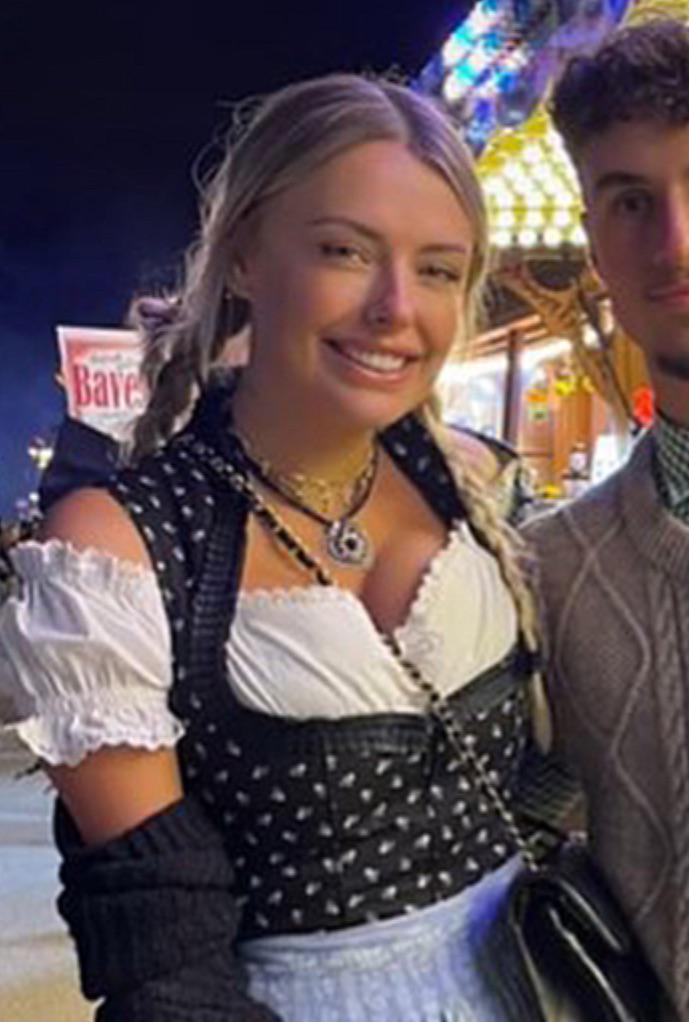Corinna Kopf Leaked The Internet Scoop That Drove Everyone Crazy
In today’s hyper-connected digital landscape, a single leak can send shockwaves through the online community, stirring up a whirlwind of emotions and debates. Few events have captured the public’s imagination as vividly as the recent incident involving Corinna Kopf—a widely recognized influencer known for her charismatic online presence—whose private content was leaked, igniting a controversy that reverberated across social media platforms. This incident not only thrust Kopf into the center of a media maelstrom but also highlighted broader issues of digital privacy, consent, and the evolving nature of celebrity in the modern age.
The leak, which surfaced unexpectedly, quickly became a topic of intense discussion among fans, critics, and casual onlookers alike. What started as a single breach of privacy escalated into a full-blown cultural moment, sparking debates about the responsibilities of both influencers and their audiences in the digital era. With every share, tweet, and comment, the story grew—each new reaction underscoring how the boundaries between public persona and private life have become increasingly blurred.
In this article, we explore the many dimensions of the Corinna Kopf controversy. We begin by examining who Corinna Kopf is and why she has become such a household name in the world of social media. We then delve into the details of what led to the leak, analyzing the factors that contributed to its explosive spread. Following this, we examine the mixed reactions from the public, considering how diverse responses reveal deeper truths about modern online culture. We also discuss the implications of the incident for Kopf’s career and the broader influencer landscape. Moreover, we address the critical issues of privacy and consent that lie at the heart of this controversy. Finally, we conclude by reflecting on the lessons learned from this episode and suggesting ways to move forward in an era where personal content can become public property with just a single misstep.
This multifaceted examination not only provides context for the leak but also raises important questions about digital ethics, celebrity culture, and the future of online privacy. As we unravel the threads of this incident, we aim to offer a comprehensive understanding of how one moment of vulnerability can evolve into a global phenomenon—and what that means for all of us who live our lives online.
Who is Corinna Kopf?
Corinna Kopf is a prominent figure in the realm of digital media—a social media influencer who has managed to capture the attention of millions with her engaging personality and creative content. Originating from a background that blends gaming culture with lifestyle vlogging, Kopf has successfully built a brand that resonates with a diverse audience. Her journey into the limelight is characterized by her natural charm, openness, and an ability to connect with followers on a personal level.
Born into an era where digital platforms have the power to transform lives, Kopf leveraged her early exposure to social media to carve out a niche for herself. Over time, she has become not only a content creator but also a trendsetter—pushing the boundaries of what it means to be an influencer. With a strong presence on platforms such as Instagram, Twitch, and YouTube, she has created communities that thrive on authenticity and real-time interaction. Her content, ranging from personal vlogs and gaming sessions to behind-the-scenes glimpses into her life, has earned her a reputation for being both relatable and innovative.
Kopf’s appeal lies in her ability to balance personal vulnerability with a polished public persona. This delicate equilibrium has made her a favorite among fans who see her as a beacon of authenticity in a sea of manufactured online images. However, it is this very openness that has also rendered her susceptible to the pitfalls of internet culture—where a moment of personal exposure can quickly spiral out of control. As seen with the recent leak, the very traits that have contributed to her success also opened the door to a significant breach of privacy.
Her rise to fame is a testament to the evolving dynamics of modern celebrity. Unlike traditional stars whose careers were often defined by controlled media appearances, influencers like Kopf exist in a space where personal and public lives are intertwined. This hybrid identity, while endearing to her fans, also exposes her to unprecedented scrutiny. Every personal decision, every misstep, and every instance of vulnerability is magnified in the public eye, sometimes with unexpected and far-reaching consequences.
The phenomenon of influencer culture, as exemplified by Corinna Kopf, underscores a new paradigm in media consumption. In this digital age, the boundaries between personal life and public content are increasingly porous, raising questions about privacy, authenticity, and the right to control one’s narrative. As we delve deeper into the incident at hand, it becomes clear that Kopf’s story is not just about one individual—it reflects broader societal shifts that are redefining what it means to be a public figure in the 21st century.
What Caused the Controversy?
The controversy surrounding Corinna Kopf erupted when private content—once considered off-limits—was leaked online without her consent. The leaked material, which quickly found its way onto various platforms, included intimate details and personal moments that were meant to remain private. The shock was not only due to the nature of the content but also because of the sheer speed and breadth with which it spread across the internet.
At its core, the leak was a stark reminder of how vulnerable public figures can be when personal information is disseminated without permission. In an era where digital content is both ephemeral and easily replicable, the incident raised immediate questions about security, data protection, and the responsibilities of those who manage personal content online. Many began to ask: How could such sensitive information be exposed, and what mechanisms failed to protect her privacy in the first place?
Several factors contributed to the rapid escalation of the controversy. Firstly, the inherently viral nature of social media meant that once the content was posted—even inadvertently—it was quickly shared, commented on, and dissected by millions. Within hours, what began as a single leak transformed into a global discussion, with various stakeholders weighing in on the implications of the breach. The online community, always eager for the next big scoop, latched onto the incident, amplifying it through countless reposts and discussions.
Secondly, the context in which the leak occurred played a significant role. Influencers today operate under a culture of transparency and relatability, which often encourages sharing personal details with their audience. This culture, while fostering a sense of intimacy and trust, also blurs the lines between what is public and what is private. As such, when the leaked content emerged, it felt like a betrayal—not only of personal boundaries but also of the unwritten social contract between public figures and their followers. Fans felt conflicted; many were torn between their admiration for Kopf and their concern over the violation of her privacy.
Furthermore, the leak reignited debates about digital ethics and the responsibilities of both content creators and consumers. In many online discussions, the focus shifted from the content of the leak itself to broader questions about consent and the right to privacy in the digital age. What does it mean to have a private life when one’s personal details are so readily available online? How should society balance the public’s insatiable curiosity with an individual’s right to control their own narrative? These questions, already simmering beneath the surface of modern internet culture, were brought to the forefront by the Corinna Kopf incident.
The controversy also shed light on the darker side of internet fame. While many influencers enjoy the perks of social media stardom, they are also vulnerable to exploitation and cyberbullying. The leak served as a cautionary tale about the potential consequences of living life in the public eye. It demonstrated that the digital world, despite its many opportunities for connection and creativity, can be unforgiving and invasive—especially when it comes to personal privacy.
In summary, the controversy was fueled by a convergence of factors: the viral nature of digital content, the blurred boundaries between public and private life, and the ongoing debate over digital ethics and consent. The fallout from the leak was not merely about the content itself but about what it represented—a call for greater awareness and respect for privacy in an increasingly digital society. As the story unfolded, it became evident that this was not an isolated incident but rather a symptom of a larger cultural shift in how we perceive and manage personal information online.
Public Reactions: A Mixed Bag
The public’s response to the Corinna Kopf leak was as varied as the online community itself. Social media platforms became battlegrounds where supporters and critics clashed over the incident, each group bringing its own perspective on the matter. On one side were fans who rallied in defense of Kopf, emphasizing her right to privacy and calling for compassion and understanding. On the other, a more cynical faction of internet users seized the opportunity to make jokes, share memes, and, at times, cross the line into outright disrespect.
Many of Kopf’s supporters viewed the leak as a gross invasion of privacy, arguing that regardless of her celebrity status, she deserved to have her personal boundaries respected. For these fans, the incident was not just about the exposure of private content—it was a broader commentary on the challenges faced by public figures in a digital age that often prizes sensationalism over sensitivity. Online petitions, supportive hashtags, and heartfelt messages flooded social media, with many urging platforms to take stronger action against unauthorized content sharing. These reactions highlighted a growing sentiment that the digital community should stand up for privacy rights and demand accountability from those who profit from such breaches.
Conversely, there was a segment of the internet that treated the leak as fodder for humor. In a culture where controversy often translates into viral content, some users saw the incident as just another scandal in the world of influencer gossip. Satirical posts, memes, and even parody videos proliferated, reflecting a disconnect between the gravity of a personal violation and the casual manner in which it was sometimes treated. This group’s reactions underscored a darker aspect of online discourse—a tendency to trivialize or even exploit personal misfortunes for entertainment, without fully considering the real-life impact on the individuals involved.
The mixed public reaction further revealed the complex dynamics at play in today’s digital society. The very nature of social media allows for rapid dissemination of information, but it also means that nuanced discussions often give way to polarized opinions. For every message of support and empathy, there was an equally vocal counterpoint that dismissed the incident as mere “drama” in an oversaturated media landscape. This dichotomy brought into sharp relief the challenges of navigating a digital world where every action is amplified and every reaction is instant.
Moreover, the incident sparked broader conversations about the responsibilities of online communities. Many argued that while freedom of expression is a fundamental right, it must be balanced against the need for empathy and respect—especially when dealing with sensitive personal issues. The Corinna Kopf leak thus became a catalyst for discussions on digital ethics, prompting questions such as: Should there be limits to what is acceptable in online discourse? How can platforms better protect individuals from harmful content without stifling free speech?
Amidst the clamor of opinions, one common thread emerged: the undeniable impact of the leak on Kopf’s personal and professional life. The mixed bag of reactions not only demonstrated the polarization inherent in online communities but also served as a reminder of the human cost behind every viral story. As the digital age continues to evolve, the incident underscores the need for a more compassionate and measured approach to consuming and reacting to online content—one that recognizes the profound effects that public scrutiny can have on a person’s life.
Implications for Kopf’s Career
For an influencer like Corinna Kopf, whose brand is built on personal authenticity and public engagement, the fallout from such a leak can be both career-defining and potentially transformative. In an industry where reputation and trust are paramount, any breach of privacy can trigger a ripple effect, altering the dynamics between an influencer and their audience. The incident has forced both fans and critics to reassess Kopf’s public persona, and it raises important questions about the sustainability of influencer culture in a digital era where boundaries are continually shifting.
One immediate implication for Kopf’s career is the need to navigate the delicate balance between transparency and privacy. Over the years, influencers have thrived on sharing intimate details of their lives, thereby forging deep connections with their audience. However, this openness can backfire if personal content is exploited or misused. The leak has underscored the vulnerability that comes with living life online—a vulnerability that could potentially affect future partnerships, sponsorships, and even collaborations. Brands that once saw her as a beacon of authenticity might now pause to consider the risks associated with endorsing a figure who has experienced such a public violation.
Furthermore, the incident has sparked an industry-wide discussion about digital security and the protection of personal data. As influencers become more integral to marketing and advertising strategies, safeguarding their personal content is increasingly important—not just for the individuals themselves, but also for the companies that invest in their public image. Kopf’s situation may well serve as a wake-up call for both influencers and brands to adopt more robust measures against data breaches and unauthorized content sharing. In doing so, the industry might see a shift towards greater emphasis on privacy protection protocols and digital ethics.
On a more personal level, the way Kopf chooses to respond to the controversy could shape the next phase of her career. History has shown that public figures who handle scandals with grace and accountability often manage to turn adversity into an opportunity for growth. By addressing the leak head-on—whether through a public statement, a heartfelt video, or even a candid discussion about digital privacy—Kopf has the chance to not only regain control of her narrative but also to inspire a broader dialogue about personal boundaries in the digital age. Such a response could transform a moment of vulnerability into a testament of resilience, further endearing her to fans who value honesty and courage in the face of adversity.
Conversely, if the situation is mishandled or if the response is perceived as dismissive, it could lead to long-term damage to her brand. In today’s climate, where online controversies can linger indefinitely, even a minor misstep might be amplified and scrutinized for years to come. The stakes are high, and every public reaction contributes to a complex tapestry of perception that will ultimately determine her future success. Influencer culture is unforgiving, and the line between personal expression and public scrutiny is thinner than ever.
Beyond the immediate career implications, the incident also reflects on the broader trajectory of influencer marketing. The digital ecosystem is evolving rapidly, and incidents like these force both creators and brands to reexamine their practices. As audiences become more discerning and privacy concerns more pronounced, the pressure is on for influencers to not only maintain authenticity but also to assert control over their personal data. The long-term impact of the leak on Kopf’s career will likely be measured not just by immediate public reaction, but by how effectively she can navigate the challenges of digital vulnerability while continuing to connect with her audience in a meaningful way.
In summary, the implications for Corinna Kopf’s career are profound and multifaceted. The incident serves as a cautionary tale about the delicate balance between public engagement and personal privacy, while also highlighting the potential for personal growth and industry-wide change. Whether this moment becomes a turning point that redefines her public persona for the better—or a setback that proves difficult to overcome—remains to be seen. What is clear, however, is that the controversy has already left an indelible mark on the influencer landscape, prompting a rethinking of digital security, personal boundaries, and the responsibilities of both creators and their audiences.
The Bit of Privacy and Consent
At the heart of the Corinna Kopf controversy lies an enduring debate over privacy, consent, and the ethics of sharing personal content in a digital age. In an environment where nearly every moment of a public figure’s life is potentially subject to scrutiny, the right to privacy becomes both a luxury and a necessity. The leak of Kopf’s private content not only breached her personal boundaries but also ignited a broader discussion about how society should treat sensitive information in an era where digital footprints are permanent and far-reaching.
Digital privacy is a complex issue that touches on many aspects of modern life. For influencers, whose appeal often stems from the very openness that makes them relatable, the distinction between public persona and private life is increasingly ambiguous. The incident with Kopf highlights a critical failure in maintaining this boundary. When personal content is leaked without consent, it is not merely a personal violation; it is a public ethics issue that demands a reevaluation of how we interact with digital media. The unauthorized sharing of intimate material erodes the foundational trust between content creators and their audiences and calls into question the measures taken by platforms to protect sensitive data.
Moreover, the debate on consent extends beyond the individual—it is a reflection of the broader responsibilities that come with the digital revolution. As consumers of online content, people must become more aware of the impact of their actions. Sharing or commenting on leaked material without considering the human cost contributes to an environment that prizes sensationalism over empathy. In discussions following the Kopf leak, many voices in the digital community have emphasized the need for respectful engagement. They argue that true support for a public figure should be demonstrated not by exploiting their vulnerabilities but by advocating for stronger protections and ethical behavior online.
The ethical challenges surrounding privacy and consent are further complicated by the rapid pace at which digital content spreads. In traditional media, checks and balances exist to control the flow of sensitive information; however, the democratized nature of social media has upended these controls. Anyone with access to a smartphone or a computer can disseminate personal content to millions in a matter of seconds. This unregulated flow of information forces society to confront uncomfortable questions: How do we define consent in a world where boundaries are increasingly porous? What obligations do both platforms and users have in safeguarding personal content? The fallout from the leak underscores the urgent need for clearer guidelines and more robust digital security measures.
In this context, the incident also serves as a powerful reminder of the importance of digital literacy. As audiences, understanding the ethical dimensions of our online actions is crucial. By promoting awareness about privacy rights and the potential consequences of sharing personal data without consent, we can help create a culture that values respect over sensationalism. The Kopf leak, painful as it may be for those directly affected, offers an opportunity to reflect on how we navigate the complexities of digital privacy and to advocate for a more conscientious approach to online interaction.
Ultimately, the debate over privacy and consent is emblematic of a larger cultural shift. The digital age has redefined traditional notions of personal space, making it imperative for society to adapt. While influencers like Corinna Kopf continue to inspire millions with their openness and authenticity, they also remind us that even the most public figures deserve a measure of control over their personal lives. Upholding the right to privacy is not just about protecting individuals—it is about fostering an environment where digital interactions are guided by empathy, respect, and a clear understanding of consent.
The aftermath of the Corinna Kopf leak is a multifaceted phenomenon—one that not only affects the influencer herself but also resonates deeply within the broader digital community. As the dust begins to settle, several key themes have emerged: the necessity of responsible digital citizenship, the need for improved privacy protocols, and the enduring impact of public controversy on personal lives. This final section reflects on these themes and offers a conclusion that seeks to chart a path forward in an increasingly complex digital environment.
In the wake of the leak, many have called for a more measured and empathetic public discourse. For supporters of Kopf, the incident has been a rallying cry to stand up against the reckless dissemination of personal content. Social media campaigns and calls for respectful dialogue have emerged, urging followers to move beyond mere sensationalism and focus on the human story behind the headlines. This push for empathy is not just about defending one individual; it is about redefining how we engage with digital content and ensuring that personal vulnerabilities are met with care rather than mockery.
At the same time, the incident has spurred a critical examination of the systems in place to protect digital privacy. Content creators and influencers alike are now more aware of the need for robust security measures, and there is growing pressure on digital platforms to implement stronger safeguards against unauthorized leaks. The Kopf leak stands as a cautionary tale for the industry, highlighting the potentially devastating consequences of neglecting privacy protocols in a digital age where information is as fleeting as it is permanent.
The long-term implications of the incident are still unfolding. For Corinna Kopf, the path ahead will likely be defined by how she chooses to address the breach—whether by reclaiming her narrative through openness and vulnerability, or by retreating from the relentless gaze of the public eye. In either scenario, her response will not only influence her personal brand but also contribute to the broader dialogue on privacy, accountability, and the responsibilities of digital citizens.
Moreover, the controversy has underscored the need for a cultural shift in the way we perceive and consume online content. As the digital landscape continues to evolve, it is imperative that both influencers and their audiences develop a more nuanced understanding of the fine line between public interest and personal privacy. Encouraging responsible behavior online—whether through self-regulation or platform policies—will be key to ensuring that future incidents of this nature are handled with the sensitivity and respect they deserve.
In conclusion, the Corinna Kopf leak is more than just a sensational headline; it is a complex event that encapsulates many of the challenges and opportunities of modern digital life. It has revealed the vulnerabilities inherent in influencer culture, ignited debates over privacy and consent, and served as a wake-up call for a more compassionate and secure online ecosystem. As we move forward, it is essential for all stakeholders—content creators, digital platforms, and consumers alike—to reflect on the lessons learned from this controversy. By advocating for stronger privacy protections, fostering respectful online communities, and recognizing the human impact of digital breaches, we can hope to build a future where the benefits of digital connectivity are not overshadowed by its risks.
EN -
Bobbi Althoff Leaks An Overview Of The Scandal And Its Impact
Sophie Rain Cute Glasses and Lingerie – A Stylish Fusion
Lifestylebrooklyn Coffee Shop Attracts Huge Lines After Facing Closure
I Gave My Groom A Nsfw Lap Dance At Our Wedding Guests Cringed But He Loved It
Salice Rose Nude Unveiling The Allure Of Art And The Impact On Artistic Expression
Airikacal Unveiling The Allure Of Nude Art And The Impact On Artistic Expression
Aida Victoria Merlano Horse Video Pesona Dunia Kuda Dalam Video Viral




 | Sitemap | Mail
| Sitemap | Mail